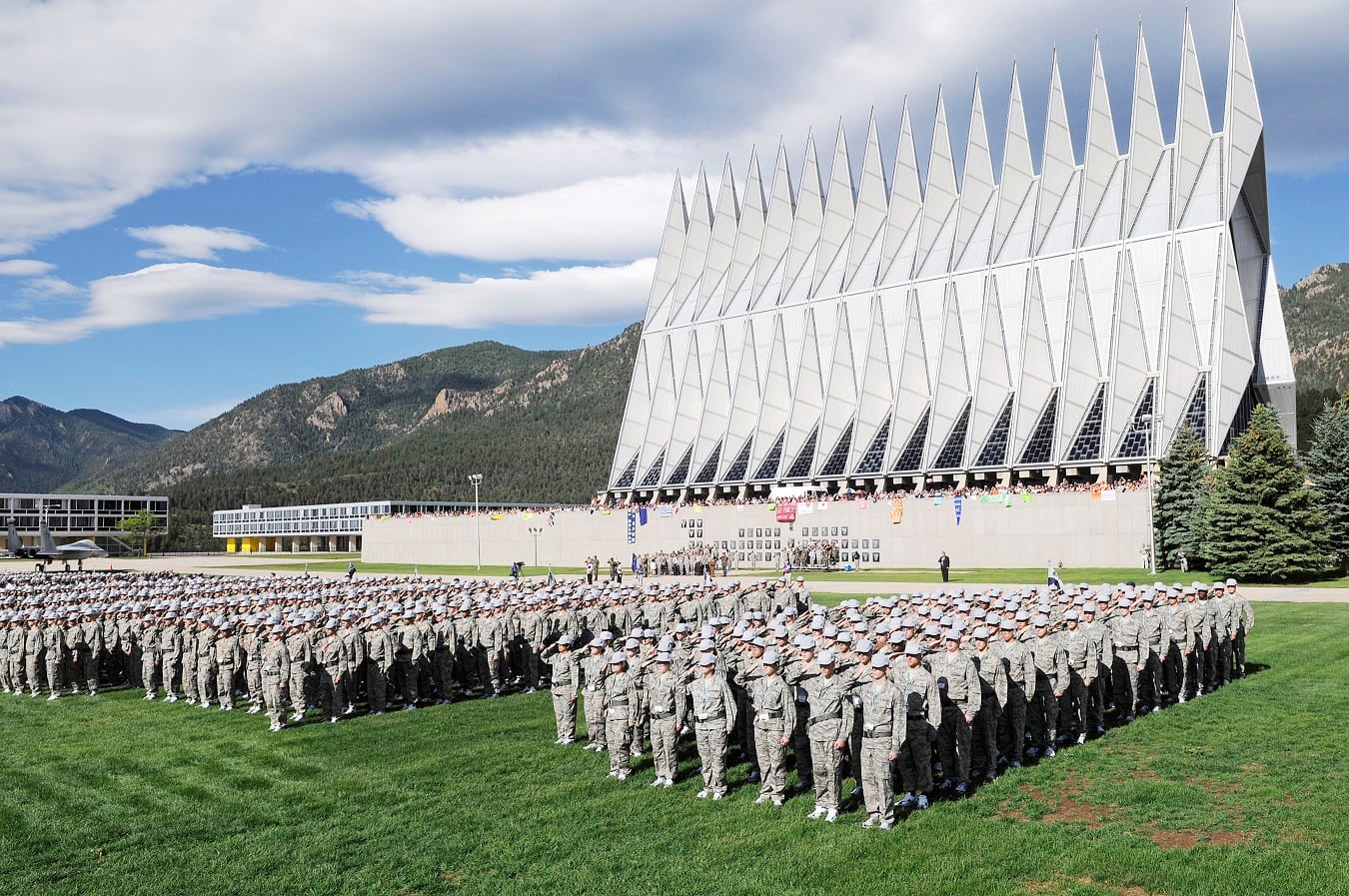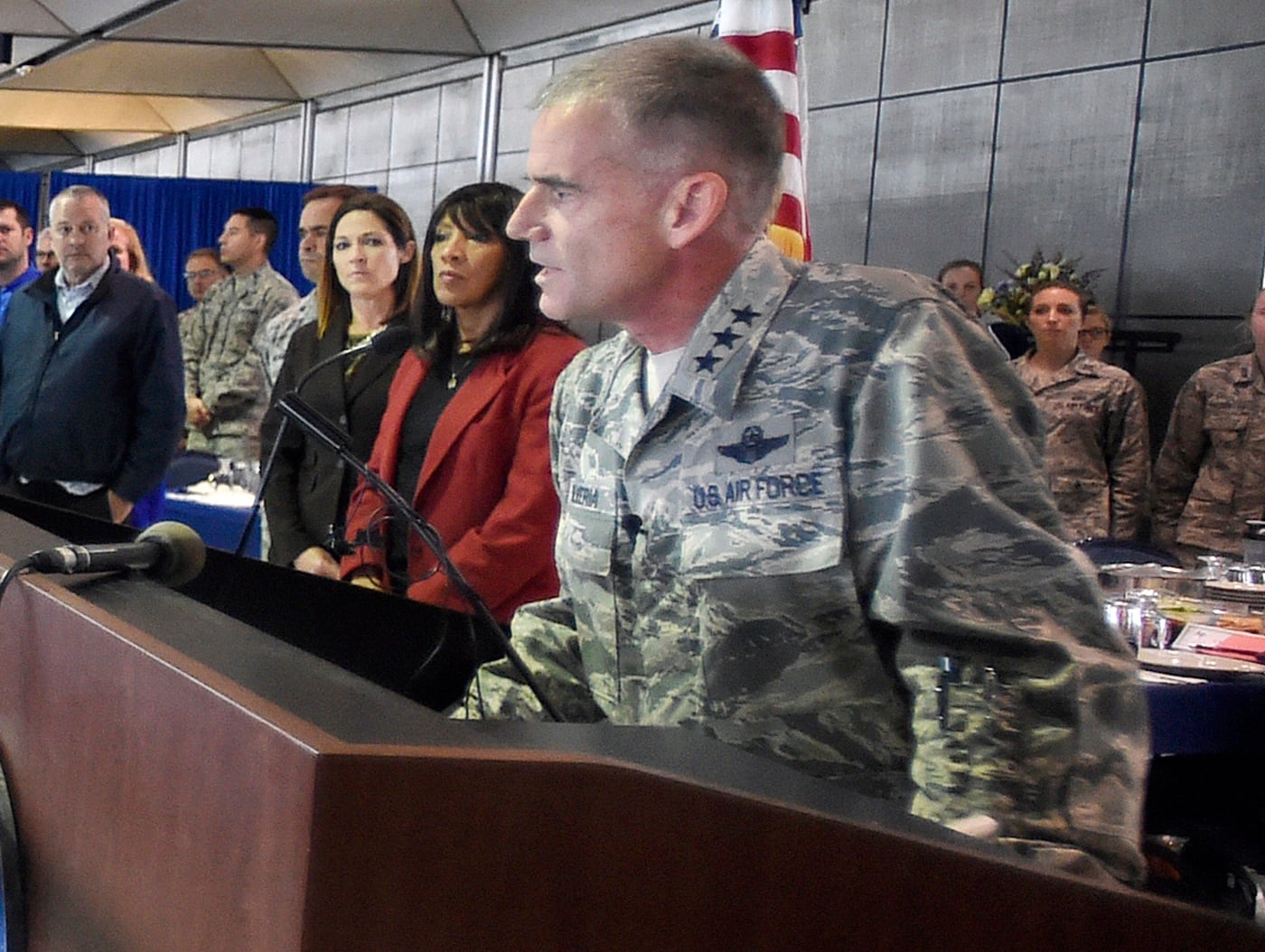The Air Force Academy preparatory school cadet candidate who wrote racial slurs outside of his and four other cadet candidates’ dorm rooms last year tried to blame his actions on an untreated concussion.
In an Oct. 24 interview, the unnamed cadet candidate wrote and signed a statement in which he attempted to explain his actions, according to a copy of the investigation report obtained by Air Force Times via the Freedom of Information Act.
“On the night in question I was struggling with a concussion,” the cadet candidate said in his handwritten statement. “Therefore I wasn’t myself. ... I’m sorry I didn’t say anything before. I should’ve just gotten treatment for my head.”
The report, or at least the unredacted portions that were released, did not appear to confirm nor refute whether the cadet candidate actually had a concussion, or whether investigators determined it played a part in the incident.
Academy spokesman Lt. Col. Allen Herritage said in an email that due to medical privacy rules, the school could not answer any questions about the former student’s medical history or condition.
Herritage said the academy could not comment on whether officials determined any other factor drove this incident, or motivated the cadet candidate.
The academy was shocked after the words “Go home n****r” were discovered written on the white boards of five black cadet candidates at the Air Force Academy Preparatory School the evening of Sept. 25.
Within days, it had become national news and prompted superintendent Lt. Gen. Jay Silveria to sternly denounce racist attitudes in a speech to the entire academy.
“Just in case you’re unclear about where I stand on this topic, ... if you can’t treat someone from another race or with different color skin with dignity and respect, then you need to get out,” Silveria said. “That kind of behavior has no place at the prep school, it has no place at USAFA, and it has no place in the United States Air Force.”
After investigating, the academy announced Nov. 7 that one of the cadet candidates who was originally believed to be a victim had admitted to being responsible.
Herritage said at the time that the cadet candidate is no longer a student at the prep school. The academy declined to say anything further about the case last November, citing Privacy Act restrictions.
RELATED

Each year, the prep school allows about 240 cadet candidates, who don’t yet meet the standards to attend the academy, to train and study over 10 months for the chance to become full-fledged cadets. Some are prior enlisted airmen, some are recruited athletes, and some are “diversity students” who come from disadvantaged backgrounds such as poor school districts.
Investigators believed the incident ― which was investigated as a hate crime ― violated Article 117 of the Uniform Code of Military Justice, which forbids “provoking speeches and gestures,” and Article 133, or conduct unbecoming an officer and a gentleman.
‘We have a problem’
The report lists 20 interviews with victims and witnesses, many of whom described a typical, quiet Monday night after Taps at the prep school ― doing homework, playing with Nerf guns, mixing music, or Facetiming with girlfriends.
But around 10:25 p.m., a cadet candidate went to get a snack from the day room and first noticed a racial slur.
“What is this?” the cadet candidate reportedly yelled to the other students when he first saw the slurs. “We have a problem.”
Other cadet candidates began filing out of their dorm rooms, and some saw slurs had also been written on their white boards.

The incident raised strife in the prep school, and cadet candidates began suspecting one another. Some pointed to other cadet candidates with a history of making racial comments, including one who had been seen playing racist songs in the day room.
At least two witnesses discussed an incident in which threatening notes written in Russian — including phrases such as “I watch you sleep at night,” “You will join them in pain,” “No one can protect you,” and “Foreigner” — had been left in cadet candidates’ dorm rooms.
One student, who felt he or she was unfairly suspected of writing the Russian notes, suspected the white board slurs were written by another cadet candidate who had used racial slurs to describe Hispanic and Middle Eastern people.
A witness told an investigator that another unnamed person at the prep school was rumored to have said on the night of the incident, “Why are they so mad? It’s not like they burned a cross or anything.”
Some cadet candidates said they didn’t feel safe at the prep school anymore and wanted to leave.
In the first round of interviews with witnesses and victims, all denied knowing who wrote the slurs, the investigation report said.
On Oct. 2, investigators collected previously known handwriting samples from cadet candidates, and three days later had a forensic document examiner from the Army Criminal Investigation Laboratory compare them to the slur handwriting.
The handwriting expert zeroed in on one cadet candidate’s sample.
On Oct. 16, that cadet candidate was interviewed and ― after waiving his right to counsel and agreeing to provide a sworn statement ― denied writing the slurs or knowing who was responsible.
He also said that he sought treatment for head trauma Oct. 14 at the academy’s clinic. He then accepted an investigator’s offer to take a polygraph examination.
On Oct. 23, the Army’s final forensic report officially concluded the cadet candidate’s “known hand writing sample had significant characteristics in agreement with the suspect writing on the boards,” the report said.
The next day, the cadet candidate was advised of his Article 31 rights, and he again waived his right to counsel before taking the polygraph examination. The polygraph was inconclusive the first time he denied writing the slurs, but the second time he was asked, the polygraph indicated deception, the report said.
After the second round of polygraph questioning, the cadet candidate was confronted with the signs of his alleged deception, and he confessed to writing the slurs, the report said.
The cadet candidate “stated that after receiving injuries, he had sensitivity to light, which he knew was a symptom of concussion,” the report said.
He “did not seek treatment for the injury [and] stated as a result of the concussion, he took a marker and wrote the racial slurs on the white boards in building 5210.”
He told investigators he originally went down to another floor to get his phone charger and say good night to an unnamed person. He then wrote a racial slur halfway on a white board, before erasing it. He then went on to write slurs on five boards, including his own.
The cadet candidate “stated he apologizes for not saying anything about the racial slurs and should have received help for his injury,” the report said.
The investigation was signed by Lt. Col. Marcus Corbett, the head of the 10th Security Forces Squadron at the academy, and was closed on Nov. 2.
Stephen Losey is the air warfare reporter for Defense News. He previously covered leadership and personnel issues at Air Force Times, and the Pentagon, special operations and air warfare at Military.com. He has traveled to the Middle East to cover U.S. Air Force operations.





